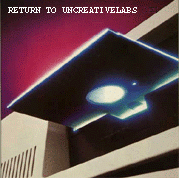| Author |
Message |
T-R-A

Joined: 02 Oct 2004
Posts: 594
Location: Western NC

|
 Posted:
Wed Jan 05, 2011 11:23 am Posted:
Wed Jan 05, 2011 11:23 am |
  |
|
  |
 |
harshbarj
Joined: 01 Oct 2004
Posts: 169
Location: behind you!

|
 Posted:
Thu Feb 03, 2011 3:06 am Posted:
Thu Feb 03, 2011 3:06 am |
  |
Wow! Now I need to dig out some of my old 'yellow' systems and give that a try. My old Zenith supersport 386 is starting to turn from a deep yellow to an almost brown color. I see a lot of hydrogen peroxide being used and soon. Thanks for posting.
When I do this I will post pics. Now to find a uv light |
_________________
Raise Your IQ. Eat Gifted Children. |
|
    |
 |
MCbx
Joined: 09 Mar 2011
Posts: 1

|
 Posted:
Wed Mar 09, 2011 8:55 pm Posted:
Wed Mar 09, 2011 8:55 pm |
  |
A good sources of UV:
- Sun - in sunny day - it should take a few weeks...
- An old quartz sun lamp - use older ones, mine is from 1970s, and I use this to erase EPROMs.
- A halogen bulb - you will have to remove something to make it light a bit UV.
- A germicidal lamp.
- An old light bulb from street lamp with removed outer bulb, safety filament improvised with a resistor and a coil to supply the stable power (I've never used it).
Remember that UV is dangerous to eyes and skin!
I have bad experiences with chemical techniques. In Poland in 2002-2005 there was popular cleaning liquid, sometimes called "AGH Petrol". It was prepared in University of Science and Technology (AGH) from extraction naphtha and a few other ingredients. Applied to a plastic with a soft cloth it was working just wonderfully - all yellow or brown places just turned white without any destruction to the texture.
But, after about 5 years after cleaning the plastic becomes fragile, hard and finally it delaminates to small pieces and peels off. I've seen many old computer stuff destroyed this way. |
|
|
   |
 |
shock__
Joined: 23 Jan 2011
Posts: 4
Location: NRW, Germany

|
 Posted:
Thu Mar 10, 2011 1:47 pm Posted:
Thu Mar 10, 2011 1:47 pm |
  |
| MCbx wrote: |
| I have bad experiences with chemical techniques. In Poland in 2002-2005 there was popular cleaning liquid, sometimes called "AGH Petrol". |
Well ... Petrol sounds like some organic agent (alcohol) which keeps reacting for quite a long time.
Having just talked to a few peeps I know who are good with chemistry hydrogen peroxyde is highly unstable (which is why caution is required when handling it) and usually leaves back barely any traces, so there will be no further reaction after the cleaning procedure. |
|
|
  |
 |
|
|
